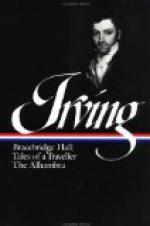His sporting dresses hang on pegs in a small closet; and about the walls of his apartment are hooks to hold his fishing-tackle, whips, spurs, and a favourite fowling-piece, curiously wrought and inlaid, which he inherits from his grandfather. He has also a couple of old single-keyed flutes, and a fiddle, which he has repeatedly patched and mended himself, affirming it to be a veritable Cremona: though I have never heard him extract a single note from it that was not enough to make one’s blood run cold.
From this little nest his fiddle will often be heard, in the stillness of mid-day, drowsily sawing some long-forgotten tune; for he prides himself on having a choice collection of good old English music, and will scarcely have anything to do with modern composers. The time, however, at which his musical powers are of most use is now and then of an evening, when he plays for the children to dance in the hall, and he passes among them and the servants for a perfect Orpheus.
[Illustration: The Children Dance in the Hall]
His chamber also bears evidence of his various avocations; there are half copied sheets of music; designs for needlework; sketches of landscapes, very indifferently executed; a camera lucida; a magic lantern, for which he is endeavouring to paint glasses; in a word, it is the cabinet of a man of many accomplishments, who knows a little of everything, and does nothing well.
After I had spent some time in his apartment admiring the ingenuity of his small inventions, he took me about the establishment, to visit the stables, dog-kennel, and other dependencies, in which he appeared like a general visiting the different quarters of his camp; as the squire leaves the control of all these matters to him, when he is at the Hall. He inquired into the state of the horses; examined their feet; prescribed a drench for one, and bleeding for another; and then took me to look at his own horse, on the merits of which he dwelt with great prolixity, and which, I noticed, had the best stall in the stable.
After this I was taken to a new toy of his and the squire’s, which he termed the falconry, where there were several unhappy birds in durance, completing their education. Among the number was a fine falcon, which Master Simon had in especial training, and he told me that he would show me, in a few days, some rare sport of the good old-fashioned kind. In the course of our round, I noticed that the grooms, gamekeeper, whippers-in, and other retainers, seemed all to be on somewhat of a familiar footing with Master Simon, and fond of having a joke with him, though it was evident they had great deference for his opinion in matters relating to their functions.
[Illustration: “Several unhappy birds in durance”]




